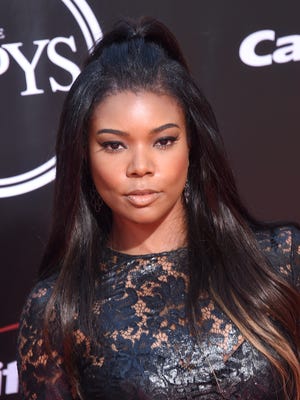Why rape survivor Gabrielle Union did Nate Parker's 'Birth of a Nation'
No one in Hollywood is likely more conflicted about Birth of a Nation writer/director/star Nate Parker's past sexual assault case than the star of the film, Gabrielle Union.

In a Friday op-ed for the Los Angeles Times, the 43-year-old actress revealed that she herself was raped at gunpoint 24 years ago in the back room of the shoe store where she worked.
Union says she learned of her director's 1999 rape case, in which he was acquitted, and the 2012 suicide of his accuser a month ago.
"Since Nate Parker’s story was revealed to me," she writes, "I have found myself in a state of stomach-churning confusion. I took this role because I related to the experience. I also wanted to give a voice to my character, who remains silent throughout the film. In her silence, she represents countless black women who have been and continue to be violated ... I knew I could walk out of our movie and speak to the audience about what it feels like to be a survivor. "
She admits her desire to take part in the "ground-breaking" film is at odds with her own instincts to express compassion for fellow survivors of sexual violence and uneasiness about working with a man, who by his own admission did not have verbal affirmation from his accuser. "Although it’s often difficult to read and understand body language," she notes, "the fact that some individuals interpret the absence of a 'no' as a 'yes' is problematic at least, criminal at worst. That’s why education on this issue is so vital."
Union, who is married to NBA star Dwyane Wade, is stepmother to his three sons, whom she says have been carefully instructed about "manners, education, the perils of drugs, stranger danger and making good choices." But lately, she's realized that's not enough. "I’ve become aware that we must speak to our children about boundaries between the sexes. And what it means to not be a danger to someone else. To that end, we are making an effort to teach our sons about affirmative consent. We explain that the onus is on them to explicitly ask if their partner consents. And we tell them that a shrug or a smile or a sigh won’t suffice. They have to hear 'yes.'”
Ultimately, she says, "I took this part in this film to talk about sexual violence ... I know these conversations are uncomfortable and difficult and painful. But they are necessary. Addressing misogyny, toxic masculinity, and rape culture is necessary. Addressing what should and should not be deemed consent is necessary."
Parker recently admitted to Ebony Magazine, "I have engaged in hyper-male culture, and I’m learning about it, and I’m learning how I can change and help young boys and young men change."
Nate Parker talks rape, male privilege with 'Ebony'
Union believes she is speaking for all the other silent victims, including college students, abused wives, molested children and the transgender community.
"Sexual violence happens more often than anyone can imagine," Union says. "And if the stories around this film do not prove and emphasize this, then I don’t know what does."